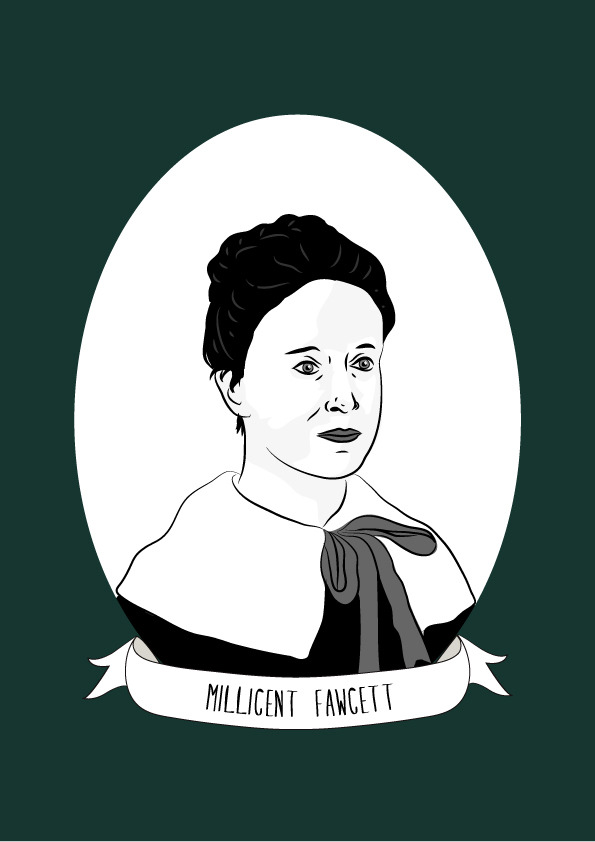Dame Millicent Garrett Fawcett, GBE was an English feminist and suffragist. She is the founder of the Fawcett Society who carry on her fight for equal rights for women.
Fawcett’s interest in politics began at an early age encouraged by her enterprising family. In 1865 Fawcett’s sister Louise took her to a speech on Women’s Rights by Radical MP, John Stuart Mill, she was impressed by his practical support for women and became one of his loyal supporters. She was also moved to support Women’s Rights when her sister, Elizabeth Garrett Anderson struggled to become a doctor.
It was through Mill that Fawcett met her husband, Henry Fawcett who had previously been expected to marry her sister Elizabeth. Elizabeth was more interested in her career and desire to become a doctor. Fawcett was encouraged by her husband to continue her career as a writer and she produced a short book ‘Political Economy for Beginners‘ which ran for 10 editions and 41 years. Her ability to craft succinct and simple explanations of complex arguements would prove useful in her future political career as a suffragist.
Fawcett became a well known public speaker on a range of topics including women’s rights, academic and political issues. In 1868 she gave a speech advocating for women’s suffragate which many thought inappropriate for the wife of an MP. Fawcett joined the London Suffrage Committee that same year, she was an exceptional organiser and later emerged as one of the leaders of the suffrage movement.
After the death of her husband she devoted herself to the fight for women’s rights, she became involved with the Personal Rights Association who were active in exposing men who preyed on vulnerable women. In 1890, she was elected President of the National Union of Women’s Suffrage Societies (NUWSS) which was the largest group campaigning for women to receive the vote. The organisation had previously only focused on women’s rights but under Fawcett expanded to cover other causes like the slave trade and formed a relief fund for South African women and children during the Boer war. She also fought to: protect children from child abuse by raising the age of consent; criminalise incest; end the exclusion of women from courtrooms when discussing sexual offenses; prevent child marriage and regulate prostitution in India.
In 1901-1914 despite expectations the Liberal Government refused to consider giving women the right to vote, this caused some fighting for the cause to engage in more militant tactics including breaking windows and later, arson. Fawcett and the NUWSS distanced themselves from this, choosing to focus on achieving the vote through constitutional means. Fawcett believed that the behaviour of the militant suffragetes was holding them back, not advancing their cause.
During WWI the NUWSS put their activities on hold, many identified as pacifists and were against the war but Fawcett supported it leading to many members leaving the organisation. The need for women to enter the workforce during the war lead to a change in opinion on votes for women – in In 1918 the Qualification of Women Act gave women over 30 the right to vote. After this, both the NUWSS and WSPU disbanded. Fawcett stopped her own involvement in politics after the 1919 Sex Disqualification Removal Act passed which made it illegal to exclude women from jobs because of their sex. Women could then become solicitors, barristers and magistrate.
Fawcett was in parliament in 1928 to witness the voting age finally being equalised. She wrote “It is almost exactly 61 years ago since I heard John Stuart Mill introduce his suffrage amendment to the Reform Bill on May 20th, 1867. So I have had extraordinary good luck in having seen the struggle from the beginning.”
